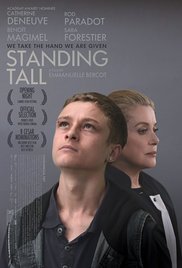Director:
Writers:
Jacques Akchoti (collaboration), Eva Husson (screenplay)
GIRLS OF THE SUN is director Eva Husson’s (BANG BANG A MODERN LOVE STORY) second feature, inspired by an actual Yazidi female combat battalion that took weapons in a fight against ISIS.
The story follows ]an impassioned war correspondent, Mathilde (Emmanuelle Bercot), into the Daesh battleground of northwestern Iraqi Kurdistan, where she is embedded with a unit of female peshmerga fighters. Led by Bahar (Golshifteh Farahani), the unit is made up of women formerly held captive — many as sex slaves (which the film emphasizes a few times)— by Daesh following the massacre of their husbands and the kidnapping of their children. Seamlessly weaving between the harrowing pasts that brought them together and their perilous present, Husson highlights the shared suffering that strengthens their bond and their will to fight to get their village, and their families, back.
GIRLS OF THE SUN is too obvious in its attempt to propagate the importance of feminine issues. The theme of a woman reporter aided by women fighters escaping the brutal ISIS fighters should be enough of a theme to state that women are just as important as men and can do their job just as well if not better.has a child. The child has to be a daughter. When a General insists that enough men have been lost in the war, the female leader says corrects him to say that women have also lost their lives. All them men are shown as either bumbling idiots, sex abusers and ugly brutes. The females, however, are sympathetic and most of them are really good-looking. It is all too easy to make the enemy so vulnerable and the women too strong. The women also break out into song of Women, Life and Liberty.
The French reporter can speak Kurdish. The Kurdish leader can speak French. Yet another case of making the story too convenient fo its own good.
The fact that French reporter could have retuned home but instead stayed behind makes no sense, especially since she has a daughter back home. She ha already lost an eye (for audience sympathy) due to a war injury. Has that not taught he a lesson yet? She an even joke that losing one eye makes it easier to sleep and she volunteers for guard duty. Really?
One can only feel sorry that this well intentioned female film with a solid plot idea has not achieved its goal. To Husson’s credit, she had done enormous research for her film. She the encompassed work of filmmaker and journalist Xavier Muntz, who she met in October 2015 while he was documenting the Kurdish resistance to the jihadi insurgency. Husson ultimately conducted roughly thirty hours of interviews with Muntz as part of her research to make the film. Muntz has a cameo playing himself in the movie. I hate to say this, but perhaps a male director would have done a better unbiased job.


 LA TETE HAUTE (STANDING TALL) (France 2016) ****
LA TETE HAUTE (STANDING TALL) (France 2016) ****